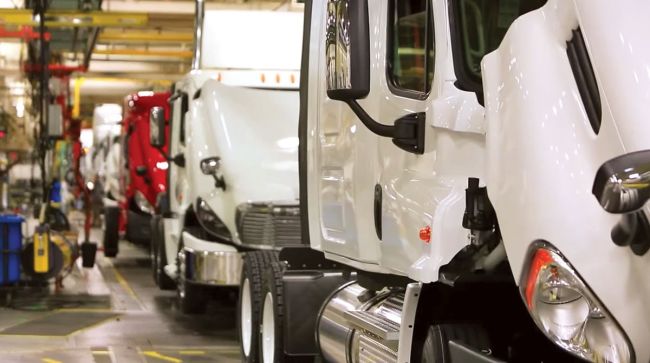Sentiment is growing that U.S. demand for Class 8 trucks in 2024 is likely to be better than expected, partly due to economic conditions that have outperformed expectations, according to an analyst.
As a result, U.S. Class 8 truck production is likely to fall by a smaller amount than forecasters previously expected, even as original equipment manufacturers catch up with ongoing backlogs, Matt Elkott, TD Cowen transportation and original equipment manufacturer analyst, told FTR Transportation Intelligence Transportation Conference attendees Sept. 11.
Elkott said the institutional investment community was eyeing improved economic prospects, and he expects a 15% to 17% year-over-year decrease in U.S. Class 8 truck production next year.
FTR expects production to total 245,000 trucks in 2024, compared with 332,000 this year, a 26% decrease, Chairman Eric Starks said at the conference, adding production in 2022 totaled 317,000 vehicles.

Starks
In 2025, FTR expects 265,000 trucks to be built, Starks said. The replacement rate is around 225,000 to 250,000 trucks.
The institutional investment community is more optimistic than other observers because of a number of tailwinds, Elkott said.
A key factor in the greater optimism is the softer landing than expected for the U.S. economy, as is supply chains still being bogged down to a certain extent.
Also, equipment demand is set to push into 2024, Elkott said, noting that before the pandemic, the backlog for truck orders typically was 90 days; now, it is six months.

Elkott
Elkott said the downturn in the freight market also is not as vicious as previous down cycles. On top of that, smaller fleets are tending not to buy based on freight sector sentiment, as major fleets do.
The 2024 freight environment, as the investment community sees it, is not set to be as weak as industry might fear, he said. Conditions are seen improving further in 2025, which would lead to an increase in smaller fleets buying equipment, he added.
Before then, FTR expects 82,000 Class 8 vehicles to be built in the third quarter of 2023, compared with 85,000 in the second quarter, Starks said. From the first quarter of 2024, production likely will start to decrease. Output is unlikely to start to improve until the second half of 2025, he said.

However, in Q3 and Q4, there are set to be an unprecedented 20,000 booked slots that will not be met, said Starks, adding that it was not normal for production slots to be filled for the next two quarters. OEMs cannot increase production, which gives heart to suppliers, he said.
The lead time for trucks is around 6.4 months at the moment, Starks said. A lead time of greater than six months is good and indicates increased activity, while a lead time of between four and six months is the sweet spot, he said, adding that the lead time is trending lower.

Transport Topics’ Seth Clevenger, Michael Freeze and Mike Senatore dissect the new Top 100 list of the largest private carriers, including how fleets are adapting to this softened market. Tune in above or by going to RoadSigns.ttnews.com.
Most buyers seem to be willing to keep to their regular replacement cycles, Starks said, adding that secondary market prices have not crashed, and therefore purchasing new trucks remains more probable for smaller operators.
There could be some cancellations for Class 8 trucks, Starks told the conference attendees in Indianapolis, but it is unlikely because buyers have waited so long that even with build slots being bumped to the next quarter, there are unlikely to be many cancellations. Cancellations are more likely in the trailer market, he said.
Class 8 sales through July were up 18.2% to 156,823 from 132,694 in the same month in 2022, according to the latest data from Wards Intelligence.






